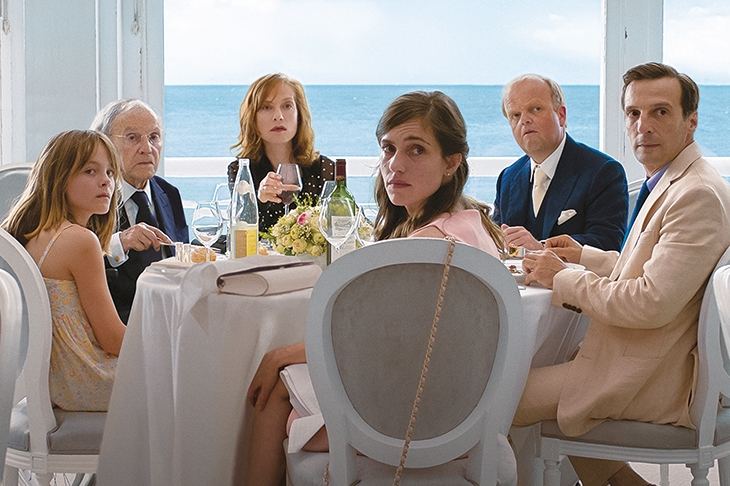The films of Michael Haneke wear a long face. Psychological terror, domestic horror, sick sex, genital self-harm — these are the joyless tags of his considerable oeuvre. Such an auteur is not the obvious sort for sequels: The Piano Teacher 2 or Hidden — Again! aren’t destined for your nearest multiplex. And yet his new film is an intriguing knight’s move away from his last. Amour (2012) was a hot-button portrait of dementia in which an elderly husband watched his wife’s mind drift away as if on an ice floe. Eventually, he smothered her with a pillow. In Happy End, the widower is back, and this time he’s out to kill himself (although the strapline on the poster is not so jaunty).
Haneke has widened the canvas to include the whole family. Amour was set in a claustrophobic Parisian apartment. Georges (Jean-Louis Trintignant) has upped sticks for Calais, where he is marooned in the capacious household of his daughter (Isabelle Huppert). The daughter briefly encountered in Amour was known as Eva while her mother was called Anne. Here she becomes Anne, and runs a construction business with her son Pierre (Franz Rogowski), an angry young alcoholic. She also houses her younger brother Thomas (Mathieu Kassovitz) with his second wife and their baby.
The latest addition to this dysfunctional ménage is Eve (Fantine Harduin), Thomas’s 12-year-old daughter by his first marriage. Eve is the story’s eyes and ears. The opening sequence is shot on her smartphone as, from an appraising distance, she live-streams her mother’s baptismal rites in the bathroom, adding mordant captions: ‘rinser … gargariser… pisser’. The mother — we never see her face — is a pill addict who soon overdoses. Eve, who has already lost a brother, is cast out of her home in sunny southerly Arles and exiled to a chilly family in the north.
Her father Thomas has his own addiction to desperate sexting with a hot cellist. (The subtitles primly skimp on their X-rated messaging: ‘mon coeur, mon cul et mon âme’ becomes ‘my heart and soul’). ‘I so wish I could help,’ Thomas says spinelessly to his daughter when she leaks affecting tears. But then every member of the family is an island. ‘Bienvenue au club,’ says Georges to his granddaughter fatalistically, before stealing away to crash a van; he succeeds in merely crippling himself.
Anne’s cure for her own isolation is to reach across the water: she is engaged to a Brit (Toby Jones, aptly looking every inch the odd one out.) Their subtly clutched hands provide the film’s only sliver of emotional optimism, but even this is tainted by money: Anne’s fiancé is something in the City who oversees the massive loan that keeps her company afloat.
Happy End is about things falling apart, from families to civilisations. Early on, a thumping great metaphor advises as much: a JCB beavers away in the vast cavity of a construction site when suddenly, on the edge of the screen, half the wall comes crumbling down. The scene is typical of Haneke’s parsimonious storytelling style. He keeps sex and death off screen. Instead he points his drily detached camera at, say, a hospital bed, or a nightclub stage, and makes the viewer hang around. In one extended take, Pierre parks on a double yellow, walks off to a grim apartment block, rings a bell, waits until a man comes down, gets punched in the face, kicked on the ground, then gets up and retreats to the car. In another dumbshow scene, Georges propels his wheelchair along a cycle path while traffic roars past in the foreground; eventually, he accosts a group of sub-Saharan Africans. Later we find out why.
This being Calais, immigration cannot be kept in the wings. It is brought into focus in two grimly awkward family celebrations but, instead of simply finger-wagging from a pulpit, Haneke muddies the picture by using the addled waster Pierre as his instrument to épater la bourgeoisie.
The title is less a spoiler than a wish. Huppert and Trintignant, as ever, perform commandingly. Fantine Harduin is exceptional as the young Eve. None can quite stir the heart in this morose critique of a fractured society.






Comments